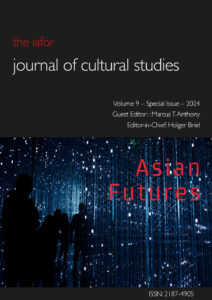"Asian Futures"

Despite the diversity of presentations, there are common themes that are notable in the papers included in this volume:
-
- The growing relevance of futures-thinking: Papers focus on future-oriented themes, contemplating the entangled future, cultivating digital wisdom, and the representation of possible futures in and of Science Fiction. This underscores the growing interest in futures studies and also the impact of technological advancements on human futures.
- Technological convergence: Several papers explore the blending of technology and human experience, such as brain-computer interfaces and the emergence of cosmological awareness, reflecting the increasing integration of technology into daily life and into possible futures of human evolution itself.
- Societal impacts: A common theme is the investigation of the societal effects of technological advancements, particularly the implications of artificial intelligence in future societies, reflecting concerns about the impact of technology on humanity.
- Global perspectives: Themes here include globalization, transnational trade, and the changing power differential between Asian and Western cultures. This suggests a shift in perspectives, including a need for the recognition of diverse cultural interactions in the study of possible Asian futures.
Environmental consciousness: There is a general awareness of environmental issues and human-nature relationships, demonstrating a broadened perspective on ecological concerns and eco-catastrophes. - Ethical considerations: Several papers consider the ethical and socio-political implications of technological advancements and the possible impacts of futures thinking, underscoring a heightened awareness of the ethical and cultural dimensions of social and technological progress.
In particular, the individual papers argued the following issues:
Article 1
The introductory paper is by Marcus T. Anthony of the Beijing Institute of Technology, Zhuhai, and is entitled “Cultivating digital wisdom in a Deep Future.” Anthony discusses the concept of Digital Wisdom, offering a framework for cultivating it and exploring the interplay between mindfulness, technology, and AI-led advancements in human cognition and mental well-being.
https://doi.org/10.22492/ijcs.9.si.01
Article 2
Luciano Zubillaga’s “Critical Thinking in the Age of Expanded Telepathy and Brain-Computer Interfaces” examines the convergence of cosmological awareness and brain-computer interface technologies, speculating on the potential disappearance of individual critical thinking in a post-human era through the direct sharing of mental states via telepathy.
https://doi.org/10.22492/ijcs.9.si.02
Article 3
“The Japanese Film AI Amok (2020) and the Collapse of Realist AI Vision” is the title of the paper by Dr. Vincenzo De Masi and Siyi Li of Beijing Normal University-Hong Kong Baptist University-United International College and Hong Kong Baptist University, respectively. It analyzes the Yu Irie movie AI Amok (2020), which explores potential hazards of artificial intelligence in a near-future Japanese society. The authors’ analysis reveals a vision of a possible future that seems to mirror current technological trajectories.
https://doi.org/10.22492/ijcs.9.si.03
Article 4
Iram Ghufran's paper “Immanent Futures, Quotidian Spaces: A View from Yiwu” features a deconstruction of Yiwu, a trading city in China. Ghufran opens a space for imagining the future, including thinking about creating livable spaces future humans, emphasizing the importance of developing sustainable relationships with the environment.
https://doi.org/10.22492/ijcs.9.si.04
Article 5
The next paper was written by Holger Briel from Beijing Normal University-Hong Kong Baptist University-United International College. In “SinoAsian Futures between Economic Forecasting, Science Fiction, Sinofuturism and Creativity,” Briel discusses the need for a corrective to traditional, forecast-oriented futures thinking. The author explores the importance of self-reflective science fiction in understanding possible futures, with a focus on the rise of Sinofuturism as a socio-political phenomenon, one which helps shed light on some of the limitations of western-centric futures thinking.
https://doi.org/10.22492/ijcs.9.si.05
Article 6
The sixth paper in this volume is entitled “The Representation of the Anthropocene in Contemporary Chinese Science Fiction.” Author Yue ZHOU of Xi’an Jiaotong Liverpool University examines the representation of the Anthropocene in contemporary Chinese science fiction, focusing on how Chinese science fiction challenges long-standing anthropocentric thinking and practices, especially in regard to catastrophic narrations of human-induced environmental issues.
https://doi.org/10.22492/ijcs.9.si.06
A deeper understanding of a complex relationship
In conclusion, the papers presented in this special volume present a diverse range of themes, covering cutting-edge technological convergence, societal implications, futures thinking, global perspectives, environmental consciousness, and ethical considerations, and these represent a multifaceted re-imagination of the possible futures of Asia and its interconnectedness with the world of people and nature. The issue thus represents an important further step towards a deeper understanding of the complex relationship between technology, society, and the future, and all this in an Asian context.
Marcus T. Anthony
Guest Editor
Zhuhai, China. April 2024

